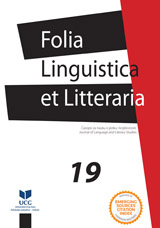SHAKESPEARE'S RENAISSANCE IN HOLLYWOOD: BRANAGH’S ADAPTATION OF HAMLET
SHAKESPEARE'S RENAISSANCE IN HOLLYWOOD: BRANAGH’S ADAPTATION OF HAMLET
Author(s): Zoran KoprivicaSubject(s): Aesthetics, Film / Cinema / Cinematography, British Literature
Published by: Filološki fakultet, Nikšić
Keywords: adaptation; prototext; psychological characterization; eros; political and epic dimensions; technical aspects; sound effect; symbolic space;
Summary/Abstract: Branagh's Hamlet, considering some of his traits, to some extent resembles his Henry V. However, his Hamlet, unlike Henry V, is not mentally unbalanced person. His film adaptation of Hamlet Branagh adjusted to modern narrative conventions. But, although he remained faithful to Shakespeare's text, Branagh made many dramatic digressions, which in turn clearly referred to the necessity of 'translation' of the literary original in the system of different aesthetic coordinates. In a word, he experiences Shakespeare's Hamlet as a 'great mystery', and his power is contained in the fact that it is always works on the viewer, even if he can not understand it. For years, according to some critics, Hollywood rejected William Shakespeare as the deadest of all the dead writers. However, everything changed in 1989 when Branagh made his Henry V. But, unlike some critics who have turned their attention to Shakespeare‘s 'breakthrough' in Hollywood, Branagh‘s film-aesthetic problem of relations in this Shakespearean tragedy is something different. Although he injected, in his own words, as much intellect in its implementation, his approach in the end was not intellectual but intuitive.
Journal: Folia Linguistica et Litteraria
- Issue Year: 2017
- Issue No: 19
- Page Range: 73-79
- Page Count: 7
- Language: English

